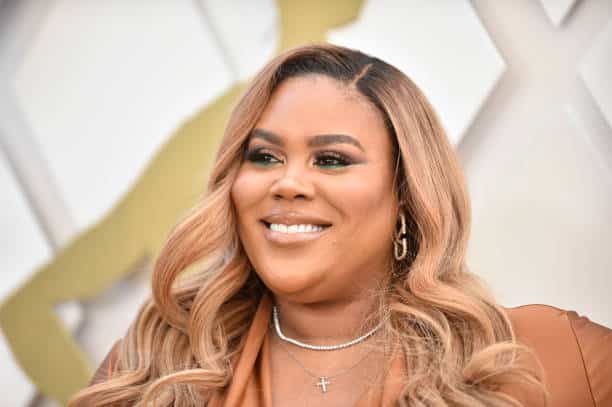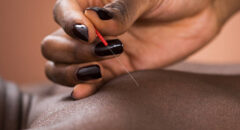
As a well-known television host and personality, Nina Parker is used to being in the spotlight, but her recent work as an advocate for Triple Negative Breast Cancer (TNBC) is a testament to her dedication to making a difference in the lives of women everywhere.
Parker's journey into advocacy began with a deeply personal experience: her mother's battle with breast cancer. In 2016, her mother was diagnosed with breast cancer, and what followed was a traumatic and challenging period for their family. Parker opens up about this difficult time in her life, revealing that it took her several years to find the strength to speak about it publicly.
"My mom's battle with breast cancer was not easy. It was a traumatic experience, and I only recently started talking about it in a major space when I joined the Uncovering TNBC campaign with Merck," the journalist explains. "Her experience in the hospital was less than ideal, and it delayed me from getting my initial breast exam. I waited longer than I should have because I was so traumatized by what happened with my mom."
According to Breastcancer.org, research shows that Black women:
- are twice as likely to be diagnosed with triple-negative breast cancer compared with white women
- are more likely to be diagnosed with late-stage disease than other women
- have the lowest survival rates in each stage of diagnosis
"Black women often have a rough time within the healthcare system," she tells BlackDoctor.org, echoing a sentiment that resonates with many. "Early diagnosis is imperative, and access to information is crucial."
RELATED: Breast Cancer Survivor Empowered by Her Diagnosis: “It Just Lit a Fire in Me”
It was this awareness that drove Parker to take action.
"We often go into our relationship with our healthcare providers as more authoritative, but it really shouldn't be that. It's to help you and serve you... I think a lot of people are afraid to get information or ask those questions, but we found that delayed screenings have been really imperative as to why it's so disproportionate to our white counterparts," the fashion designer notes. "Also [a] lack of that overall information... There's less access to a lot of Black women...We need to close that gap by providing a wealth of information. As we know wealth is literally health."
She emphasizes the importance of early screening. After her first mammogram, Parker received a callback for further examination.
"It was such a scary experience," she recalls, "and I felt that nobody was talking about it." Fortunately, her test results came back normal. After speaking to other women in her community, she quickly realized that callbacks during a woman's first mammogram are actually quite common.
"I found in speaking to other members in the community that this is actually not something that's very rare. A lot of women go to get their first mammogram and a lot of them get called back for inconsistencies because they don't have anything to compare it to. They have to make sure they're taking the right precautions," Parker adds.
This realization also spurred her to share her experience with her friends, only to discover that many of them had gone through similar situations. With this revelation, she decided to open the door to discussions about breast health and screening, especially among Black women.
Parker is currently a spokesperson for Merck's Uncovering TNBC campaign. The initiative aims to bring awareness, support, community, and information to women dealing with TNBC. "Triple Negative Breast Cancer is a more aggressive form of breast cancer, and many people aren't aware of its impact," Parker explains.
The campaign also focuses on providing resources for women, including access to advocacy groups. These groups offer invaluable advice and strategies to help Black women advocate for themselves within the healthcare system. "Doctors are people too," Parker reminds us. "Finding the right approach and being empowered to ask questions and seek second opinions can make a world of difference in your healthcare journey."
As part of her advocacy work, Parker has had the privilege of meeting and sharing stories with TNBC survivors. These encounters have reinforced her commitment to the cause and underscored the urgency of early diagnosis and access to information.
"I had an amazing sit-down with Jazmine, Keisha and Lyndsay," she says, reflecting on her conversations with TNBC survivors. "They were at different stages of life, different ages, and career paths, but TNBC affected them similarly, mentally and emotionally."
The stories of these women have had a profound impact on Parker. They've shown her the strength and resilience that Black women can exhibit when faced with adversity. "It's not a death sentence," Parker asserts. "There is hope as long as we get early screenings, provide information, and have open discussions with our healthcare providers."
Nina Parker's guidance for Black women who are advocating for their own needs
In her journey from trauma to advocacy, Parker is empowering Black women to take control of their breast health. Through her work with the Uncovering TNBC campaign and her dedication to raising awareness, providing support, and fostering a sense of community, she's changing lives and giving hope to those who need it most.
If you find yourself having to advocate on your own behalf, Parker offers some tips:
- Utilize advocacy groups. "I really recommend going to uncovertnbc.com.These advocacy groups provide a wealth of information and tips on how to approach your healthcare provider, but also just other experiences because I sometimes think that we feel like we're going through things alone," Parker says.
- Shop around until you find the right doctor. "We may not be a fit for every single doctor so I think finding that access and knowing that you actually are empowered to make these types of decisions is very very helpful. I think a lot of people think they have to stay with this one particular doctor," she adds.








